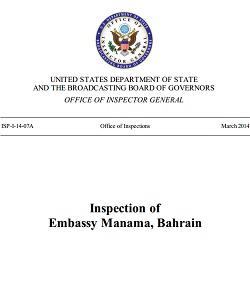Today the State Department’s Office of the Inspector General (OIG) released a new report on the Embassy in Manama, Bahrain. The report, which is the result of an inspection that took place in September and October of last year, provides critical insight into the workings of the Embassy in Manama and serves to underscore the need for clear and consistent messaging from the U.S. government with regard to its policy toward Bahrain.
While much of the report focuses on bolstering economics relations and remedying issues of internal management, emphasis was placed on the “significant challenges balancing U.S. military interests with U.S. human rights interests” in Bahrain. Additionally, the report notes that poor planning at all levels of leadership has resulted in confusion among staff about mission goals, resulting in ineffective communication of U.S. government policies on the ground.
Since beginning his tenure in October 2011, U.S. Ambassador Krajeski has been frequently attacked and criticized in the state-run media, with no response from the U.S. government. The OIG highlights the absence of a media plan to ensure more consistent messaging on U.S. policy in Bahrain, stating that: “The government-controlled press is frequently highly critical of the Ambassador but the embassy is cautious about using social media to counter this, concerned that doing so draws negative comments…Officers adept at social media can help use these tolls to improve the Ambassador’s public image and to correct misinformation about U.S. policies.”
This report serves as yet another reminder that the U.S. government must have clear and consistent messaging from all levels of government regarding U.S. policy towards Bahrain. Without receiving clarification of goals from the top, Embassy Manama, who acts as the public face of U.S. government policy in Bahrain, has been left struggling to manage an important situation. This report only serves to underscore the urgent need for the U.S. to clearly and consistently express policy interests in Bahrain that integrate military and human rights interests.
–
Diala Jadallah is Director of Advocacy at ADHRB.
Please click here for a PDF of this blog post.





